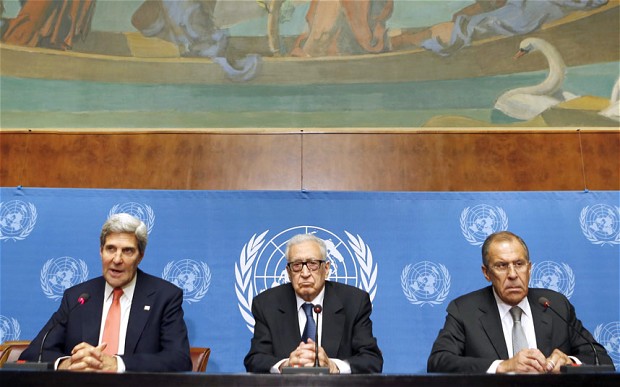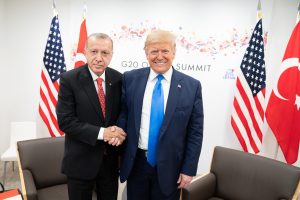by Tyler Cullis
Few places deserve less optimism than Syria, where a civil war has raged unabated for more than two years. The situation on the ground continues to deteriorate at an appreciable rate, with close to 10 million people presently in need of food relief and medical assistance and 6.5 million displaced from their homes. Even by conservative estimates, 126,000 people have fallen victim to the conflict since it began in March 2011. There is little to recommend the hopeful in Syria’s unending tragedy.
And yet for a conflict that has fallen into a kind of stasis, with neither the Syrian regime nor its opposition able to claim victory, there just might be a way forward if recent events are any suggestion. Last week, a date was finally set for the long-awaited Geneva II conference, although attendance — especially from the Syrian opposition — remains thus far unclear. The day prior, an interim deal was struck between the United States and its international partners and Iran concerning Iran’s nuclear program. The two followed so closely on the heels of one another that speculation was ripe — though empty — that the U.S.-Iran dialogue had reached as far as the Syrian conflict. Regardless, the interim deal augured well for the possibility that the U.S. extend an invitation to Iran for Geneva II and the pair compromise to realize mutual interests in ending the Syrian conflict.
This would, no doubt, require a change in the U.S.’s strategic calculus, which has thus far enacted a strict bar to Iran’s participation in the Geneva talks. But, as has long been recognized, without the Iranians at the table and without their interests adequately represented in Geneva, Iran can play spoiler to any kind of political resolution tabled there. The view in Damascus is that the Syrian regime is gaining momentum on the battlefield and can outlast the opposition, even if that means a decade or more of civil war. Without Iran’s commitment to a political transition, then, there is little end in sight.
Such a commitment is not a far-fetched idea any longer, either: Iran has good reasons to bring to a close the civil war in Syria, even if that means the removal of Bashar al-Assad. For one thing, the conflict has proved a significant drain on Iran’s own resources, as the Islamic Republic’s support for the Assad regime has required considerable expenditures in both money and manpower. While there is no clear sense as to the contribution Iran has made in terms of bodies on the ground, Iran has bankrolled a Syrian government that would have all but collapsed were it not for Iran’s financial benevolence. Further, the ongoing civil war has forced Hezbollah, Iran’s proxy, down from the mantle it once occupied in the Arab world following its July 2006 war with Israel. It is increasingly difficult to remember that, not long ago, Nasrallah, Assad, and Ahmadinejad were deemed the three most-admired world leaders in Arab public opinion. Clearly, the costs to Iran from a drawn-out conflict have been paid in blood, treasure, and reputation. Iran’s desire to staunch the bleeding should thus be obvious.
That is not to say that Iran is willing to sacrifice its interests in Syria, which are apparently deep enough to have warranted such costs in the first place. Whatever agreement is struck between the Syrian regime and its opposition will have to ensure that Iran maintains a healthy degree of influence in Damascus, or else Iran will undoubtedly favor the status quo, despite the overhead. But influence can come in many shades and certainly can be felt long after the passing of the Assad family’s reign.
In fact, by entertaining a political transition in Syria, Iran could well realize a broader set of interests. This includes the long-sought recognition that Iran is a regional power, armed with enough political influence to act as a broker between warring parties elsewhere. Should the U.S. overcome its stubborn refusal to permit Iran’s participation at Geneva II, the White House will have delivered to Iran what it has always sought: U.S. recognition that Iran cannot so easily be ignored. In doing so, however, the U.S. will turn the onus back on Iran, forcing it to live up to its promise and to deliver the political transition any deal to end the conflict requires. If Iran fails to do so, then it will have secured a narrow, perhaps fleeting victory in Syria, but lost the much larger battle for regional standing. Obviously, the pressure to deliver would be squarely on Iran’s shoulders.
Furthermore, at a time when the U.S. and Iran are speaking to each other, and the possibility exists for Iran’s reintegration into the world community after 34 years, Iran is incentivized to undertake such action as would reciprocate an American invitation to Geneva. Better than most, Iran appreciates the need to resolve the conflict in Syria. If doing so would likewise put Iran in the good graces of the U.S., then all the better, especially at such a sensitive point in the nuclear negotiations.
This all, of course, requires flexibility from the United States. As the International Crisis Group noted in a September statement, the U.S. needs to be “flexible with regards to timing and specific modalities [regarding Assad’s departure].” If Iran is willing to push Assad out, then the least the U.S. can do is accommodate the Iranians regarding the means by which the transition takes place. One possibility, entirely speculative, is that Assad depart office upon the end of his term, which, according to reforms he enacted early in the conflict, takes place next year. That would provide both the time for Geneva II participants to work out how exactly the transition will work, as well as a face-saving measure for Assad so that he can, however shamelessly, claim to be sacrificing himself to save a nation.
Is any of this, in fact, possible? That is entirely unclear. But until the U.S. includes Iran in the Geneva II process, one thing is absolutely certain: the Syrian civil war will continue on its interminable path.






Interesting article to read. In practical terms of achieving any form of success, reads more of a pipe dream, thought up by NeoCons/Bibi. How about turning off the spigot, arming the resistance, which Saudi Arabia is funding as are the U.S. too. Also, putting Iran in a position that it has no reasonable chance of working. Until the forces that fueled the conflict to begin with, as in sticking their nose in other peoples business for taking the spot light off of short comings at home, then things have to be taken in short steps. The optimism that Assad would fall quickly, is but a memory in time. As usual, Syria has become another “Clusterfuck”, which the U.S. is making its hallmark in the use of military might. Normalize relations with Iran first, acknowledge that it can be a stabilizing force in the M.E., then perhaps it will surprise everyone by playing the roll[s] being wished upon it by others.
Although the article means well and although the plight of the Syrians is tragic and every attempt should be made to end this disastrous civil war, surely it is not up to Iran or for that matter up to the West or Saudi Arabia to decide the fate of the Syrians. Whether Iran can deliver Assad or not is irrelevant and is a wrong question to ask. The correct solution would be to call for a ceasefire and elections supervised by the UN and whoever the Syrians vote for should be supported by all sides. Any other solution is inappropriate meddling in Syrian affairs, something that has brought Syria to its present plight.